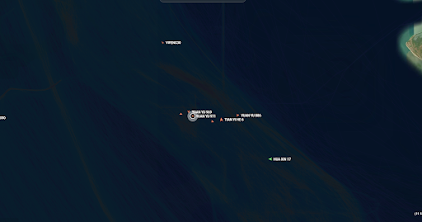May 15, 2025 — A Chinese fishing vessel issued a distress call yesterday off the coast of Guinea-Bissau, raising fresh concerns about the presence and practices of foreign fishing fleets operating in West African waters.
At 14:20 UTC on May 14, 2025, a Digital Selective Calling (DSC) distress signal was received on the international maritime frequency of 16,804.5 kHz. The message originated from MMSI 412549634, which corresponds to the YUAN YU 971, a Chinese-flagged fishing vessel. The signal was directed to "All Ships", indicating an urgent situation requiring immediate attention.
The distress transmission, received by multiple global listening posts, pinpointed the vessel’s position at 11.06°N, 17.07°W, an area just off the coast of Guinea-Bissau. This same stretch of ocean has, in recent years, become a hotspot for large industrial trawlers — predominantly Chinese — whose activities are increasingly under international scrutiny.
A Fleet Operating in the Shadows
The YUAN YU 971 is not alone. Satellite and AIS data confirm the presence of numerous Chinese fishing vessels in the same area, many belonging to the extensive "YUAN YU" fleet. These vessels are frequently accused of illegal, unreported, and unregulated (IUU) fishing, stripping West African waters of marine life and undermining local economies and ecosystems.
A 2024 report by the Environmental Justice Foundation (EJF) describes the impact of unregulated overfishing in stark terms. Chinese and European trawlers, often operating with little or no oversight, have depleted fish stocks across Senegal, Guinea-Bissau, Sierra Leone, and beyond. Local fishermen, unable to compete, are forced out of business or deeper into poverty.
Human Toll and Migration Crisis
The consequences extend far beyond environmental degradation. The loss of fish — a dietary and economic mainstay in countries like Senegal — is helping to drive a humanitarian and migration crisis. Without sustainable livelihoods, thousands of young men risk their lives crossing the Atlantic in overcrowded wooden boats.
In 2023 alone, more than 30,000 migrants from Senegal arrived by sea in Spain’s Canary Islands, according to EJF. Many cite the collapse of coastal fishing as the catalyst for their departure.
One of them, a 26-year-old named Abdou, left the fishing town of Joal-Fadiouth and spent 14 days at sea before reaching Tenerife. “There were people on the boat who had the same dream and purpose as me, but they never arrived,” he says in Adrift, a documentary by EJF. “They died at sea.”
An Unanswered Distress Call?
As of today, there is no public information available about the fate of the YUAN YU 971 or the nature of the emergency. The distress call has not been followed by any official confirmation from Chinese authorities or maritime rescue coordination centers.
The incident serves as a chilling reminder that even the vessels contributing to West Africa’s marine crisis are not immune to peril. Whether it was a mechanical failure, an onboard accident, or a clash with local forces or communities remains unclear.
Global Accountability Needed
The events of May 14 underscore the urgent need for transparency, regulation, and enforcement in international waters. The waters off West Africa have become a battleground — not just for fish, but for justice, food security, and human dignity.
As the world grapples with overfishing and its cascading consequences, the distress call from the YUAN YU 971 may be more than a technical signal — it is a warning.
"When the sea dies, so do the people who depend on it." — EJF Report, 2024


Comments
Post a Comment